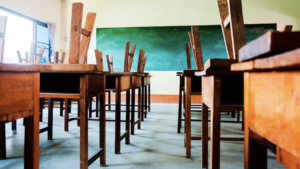Home » Commentary » Opinion » Our schools already let too many children down before this year of disruption. Where to from here?
· Spectator
 Could there be a more depressing statement about parents’ confidence in Australian schooling than a recent proposal that people invest in ASX education shares?
Could there be a more depressing statement about parents’ confidence in Australian schooling than a recent proposal that people invest in ASX education shares?
This followed on the heels of news that surging numbers of parents are hiring tutors to get their children up to speed in various areas of the curriculum.
The Motley Fool — which has a stated aim to “make the world smarter, happier and richer” — claims that “Given the weaknesses exposed in the education system, there are some companies listed on the ASX that could potentially help fill in the gaps.”
Tutoring has become a highly popular strategy for preparing students to take selective school entry examinations and reinforcing learning of all kinds, especially useful for students with disability or those who lack fluency in English.
But any significant increase in demand for tutoring is surely an indicator of what is not working in Australian schools.
Further, not every parent can afford paid tutoring. And few parents are skilled tutors in English, mathematics, science, history and all of the other subjects that should be mastered as soon and as soundly as possible.
Equitable access to devices and internet connections is also but a dream in this first-world country, with sector and school planning, geographical location and household income among many factors determining who can be online and for how long.
Policymakers have to stop fantasising about 21st-century learning agendas and get the immediate challenges right.
This means developing far better curriculum, demanding the highest standards in teacher selection and training and ensuring nationally consistent classroom practices, especially in relation to e-learning and assessment and reporting.
The current dog’s breakfast of A-E grading, so often accompanied by worthless comments, has to change.
High-performing systems set transparent, consistently high standards for teachers and students. Consequently, parents, employers and tertiary institutions have confidence in the qualifications achieved by school leavers.
Critically, the education journey from Kindergarten to Year 12 – inclusive of academic and vocational components – is based on a clear vision of what is needed for individual, community and national success.
When sharemarket tipsters such as Motley Fool identify increased investment in private education solutions as a reaction to perceived failings in Australian schooling, someone has to pay attention. At the very least, relying on tutoring is no substitute for fixing an inadequate education system.
No child’s future should be a gamble on piecemeal policymaking that too often proposes replacing unsuccessful but very shiny things with more of the same in some vague hope of improvement — a phenomenon seen over and over again in the taxpayer-funded torrent of disconnected reviews and reports in Australian education and teaching.
No one should underestimate the price being paid by children and their families during this COVID-19 pandemic. For years, tens of thousands of Australian students have been leaving school without adequate skills in literacy and numeracy, not to mention their lack of knowledge in a range of rigorous disciplines.
The disruptions of 2020 — which the OECD says will impact education to cause decades of economic loss — will sentence many more to the same fate unless mistakes are acknowledged and policy accountability becomes the norm.
Our schools already let too many children down before this year of disruption. Where to from here?